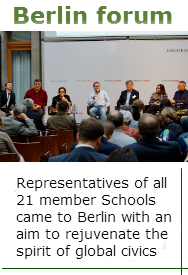Third Summer University for Democracy
Speech by Filip Vujanovic, President of Montenegro
Strasbourg, 30 June 2008
Secretary General,
Dear participants of the Summer University,
Ladies and Gentlemen,
It is a great honor and pleasure for me to speak at the opening of the Council of Europe Summer University for Democracy.
Allow me to remind you that, last May, Montenegro celebrated two years since its restoration of independence and one year since its joining the Council of Europe. Restoration of independence in the referendum as the most reliable tool for democratic expression of the citizens’ will and international recognition of such restored independence can possibly serve as a good inspiration for your discussion on this year’s topics such as governance, power and democracy.
Not only the restoration of independence of Montenegro can be inspiring for your discussion, but also entire previous three-year period of existence of the State Union of Serbia and Montenegro, which allowed Montenegro the right to self-determination in the referendum under strict conditions that ensured immediate recognition of the referendum outcome.
During that period of time Montenegro was very careful not to harm the necessary balance among governance, power and democracy. We were aware that power was not in the hands of the authorities. The power is in the hands of the citizens. Therefore, we are proud of the referendum outcome, which was highly appreciated by the international community. Such appreciation ensured fast recognition of Montenegro and its membership in global and regional international organizations.
Restoration of our independence was not only a goal in itself. The day of declaration of the referendum outcome was only beginning of a real and responsible job. Now, two years later, we can proudly look back. Not only because of the latest local, parliamentary and presidential elections that confirmed, by the majority vote, further affirmation of democratic values and stability, but also because of the Constitution and many reform laws that were adopted in the Parliament by a large majority. The Constitution was adopted by a two-third majority vote, taking into account most of the recommendations made by the Venice Commission -a separate body of the Council of Europe.
In general, our co-operation with the Council of Europe has been excellent. In two reports that have been adopted in the meantime, the Committee of Ministers monitoring missions recognized significant progress of Montenegro towards achieving the standards. We do not see these missions, including recent visit of the Commissioner for Human Rights and forthcoming visit of the Committee for the Prevention of Torture, only as opportunity to analyze the achieved level of protection of human rights. We also see them as a support for Montenegro to make new steps towards development of democracy and the rule of law and we highly appreciate it.
All important monitoring missions state that Montenegro has been on the right track. We are aware that Montenegro has gone through a difficult period of transition that caused many problems, particularly, social ones. We know that we have paid a high price for isolation due to sanctions imposed on former common state by the international community; international sanctions that were imposed because of the then Milosevic’s regime. Regime against which Montenegro stood up after it ensured that abuse of the common state could in no way endanger security and peace in Montenegro. At that period of time, in addition to international sanctions, we also faced internal sanctions imposed by the former regime in Serbia.
Sanctions are always difficult, especially for small countries that have service sector as their economic priority. Tourism and maritime are of strategic importance for Montenegro.
Now, as the independent state, we mark a fast economic growth, finding solutions for current problems. We do our best to affirm democracy values. Democracy values are of common interest, and call for co-operation among states and exchange of their respective experience in this regard.
Ladies and Gentlemen,
University for Democracy organized by the Council of Europe is, certainly, a great model of education and exchange of experience in cherishing democracy values.
Therefore, I express my appreciation to the Council of Europe for organization of this University. Results of the previous generations from the Summer University for Democracy and individual schools from this network are astonishing. Many attendants of the school have become leaders in their respective fields. Many of them now transfer their experience to new generations.
Choice of topic and participants of this year Summer University assure us that we have another generation of young people with the same mission in front of us. This time with an inspiring dilemma: where is the border between power and democracy; what is their influence on governance; and is there a definition of good governance?
You will find answers to some questions, while some of them will remain your dilemma and inspire further contemplation and future generations of this University.
Thanks for your attention.








